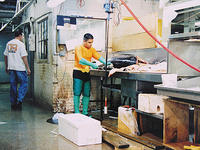-
Endangered antelope interferes with Arizona border security
Environmental concerns and border security clash along the U.S.-Mexico border; the wild Sonoran Pronghorn numbers are down to about 80 in Arizona and they occupy less than 10 percent of their original range — but what is left of their range straddles the border; environmentalists and government stewards of the environment object to the erection of a fence or watch towers, saying they would drive the antelope-like creature to extinction
-
-
U.S. federal prosecutions of immigrants hits all-time high
U.S. federal prosecutions of immigrants soared to new levels this spring; the 4,145 cases referred to federal prosecutors in March and April was the largest number for any two-month stretch in the last five years; the number of illegal immigrants in the United States has fallen — as of January 2009, an estimated 10.8 million people were in the country illegally, one million less than the 2007 — but deportations have been increasing, climbing from 185,944 in 2007 to 387,790 last year
-
-
Increased use of UAVs in border protection hobbled by shortage of UAV pilots
As hopes that SBInet, the ambitious virtual fence project along the U.S.-Mexico border, will ever live up to its promise recede, DHS has increased the role of UAVs in border monitoring; UAVs require pilots to fly them remotely, though, and Customs and Border Protection (CBP) has had trouble finding trained pilots remotely to fly the aircraft; Maj. Gen. Michael Kostelnik, assistant commissioner of CBP’s Air and Marine Office: “The greatest near-term challenge faced is a shortage of pilots and sensor operators, specifically pilots certified to launch and land the aircraft”
-
-
Utah concludes state resources were used in immigrant list
Utah Department of Workforce Services database is the source of the list of 1,300 circulated to news outlets in the state; the agency says hundreds had access to database; using state resources to compile the list would violate several state and federal privacy laws, state officials and legal scholars said
-
-
DHS IG: flawed assumptions about technology, poor contractor oversight plague SBInet

DHS’s inspector general says the trouble-plagued SBInet program rested on faulty assumptions about technology — assumptions which led both to technology failures and inadequate monitoring by DHS; the SBI program officials stated that the initial assumption that commercial off-the-shelf technology would be available to cover SBInet needs, serving as a basis for determining staffing requirements, ultimately proved to be wrong”; also, officials failed to ensure that one milestone was properly completed before progressing to the next phase, increasing the risk of significant rework and associated project delays; the future of SBInet is unclear, as earlier this year DHS secretary Janet Napolitano froze spending and ordered an assessment of the program to determine if it should continue
-
-
Senate subcommittee approves about $15 billion to bolster border activity
Measure allocates $3.57 billion for 20,370 border patrol agents, with 17,000 based on the U.S. Southwest border, more than double the agents in 2004; about $20 million would go toward counter-drug initiatives for southbound operations lanes, personnel, and equipment to stop the outbound flow of weapons and currency used in the drug trade; $20.5 million for one additional unmanned aircraft system and support equipment; the bill include $9 billion for the Coast Guard
-
-
Detailed list of 1,300 alleged illegal immigrants circulated in Utah

An anonymous group circulated a list containing the names and personal information of 1,300 people, whom the anonymous group contends are illegal immigrants, to government agencies and news outlets in Utah; most of the names on the list are of Hispanic origin; the list contains highly detailed personal information such as Social Security numbers, birth dates, workplaces, addresses, and phone numbers; names of children are included, along with due dates of pregnant women on the list; the group demands that the people on the list be deported immediately; Governor Gary Herbert ordered an investigation; Utah’s Hispanic community terrified
-
-
Coalition of Tucson businesses launches campaign against Arizona harsh immigration law
A coalition of 90 Tucson, Arizona businesses launches a “We Mean Business” campaign to show their resistance to SB 1070 — the harsh immigration law set to take effect 29 July; many of the owners agree there is a need for immigration reform; however they do not think the new law is the most effective approach
-
-
Second drug submersible seized
Colombia’s drug cartels frequently use semi-submersible vessels to smuggle large amounts of cocaine past American and Colombian patrol boats to Central America en route to the United States; law enforcement discovers and seizes second submersible in as many weeks: the first was seized in Ecuador, the second in Guatemala
-
-
U.S. replaces noisy immigration raids at place of employment with "silent audits"
The Obama administration has replaced noisy, media-covered immigration raids at factories and farms with a quieter enforcement strategy: sending federal agents to scour companies’ records for illegal immigrant workers; one expert says: “Instead of hundreds of agents going after one company, now one agent can go after hundreds of companies”; employers say the Obama administration is leaving them short of labor for some low-wage work, conducting silent raids but offering no new legal immigrant laborers in occupations, like farm work; federal labor officials estimate that more than 60 percent of farm workers in the United States are illegal immigrants
-
-
ICE activates Secure Communities in ten more west Texas counties
Secure Communities uses biometrics to prioritize immigration enforcement actions against convicted criminal aliens; with the addition of ten new Texas counties, all eighteen westernmost counties of Texas are currently using Secure Communities
-
-
U.S. economy influences immigration more than security measures

A Forbes’ columnist says that immigrants — legal and illegal — are an economic bellwether, and that recent rends in immigration show that both the low-skilled and high-skilled immigrants have doubts about the U.S. economy right now; a DHS study shows that overall population of unauthorized aliens in the United States dropped from 11.8 million in 2007 to 10.8 million in 2009, in parallel with the economic slow-down; the risk to U.S. national security and economic welfare are these: low-skilled immigrants will likely return when the U.S. economy picks up again, but to bring back high-skilled immigrants, America’s economy will have to do more than make a comeback — it will have to make a strong comeback
-
-
Immigration control at Welsh ports "risks U.K. security"
Immigration control at some of Wales’s ports is “limited” and jeopardizing the U.K.’s border security, says a watchdog; Holyhead seaport, for example, has no permanent immigration controls
-
-
Degree of illegal immigrants' involvement in smuggling drugs, other crimes uncertain
There are about 500,000 illegal immigrants living in Arizona; Governor Jan Brewer’s recently said that the majority of them are “drug mules” and linked them to beheadings; exploring any link between illegal immigration and other crimes is difficult, however, and there is little in the way of reliable data that indicate what crimes immigrants may commit after crossing the border illegally
-
-
U.S., U.K. military leaders address climate change's role as a global threat multiplier
Conflict brought on by droughts, famine, and unwelcome migration are as old as history itself. Yet, a growing number of military analysts think that climate change will exacerbate these problems worldwide and are encouraging countries to prepare to maintain order even as shrinking resources make their citizens more desperate; Rear Admiral Neil Morisetti: “We see climate change as a threat multiplier, as a catalyst for conflict”
-
- All
- Regional
- Water
- Biometrics
- Borders/Immig
- Business
- Cybersecurity
- Detection
- Disasters
- Government
- Infrastructure
- International
- Public health
- Public Safety
- Communication interoperabillity
- Emergency services
- Emergency medical services
- Fire
- First response
- IEDs
- Law Enforcement
- Law Enforcement Technology
- Military technology
- Nonlethal weapons
- Nuclear weapons
- Personal protection equipment
- Police
- Notification /alert systems
- Situational awareness
- Weapons systems
- Sci-Tech
- Sector Reports
- Surveillance
- Transportation
Advertising & Marketing: advertise@newswirepubs.com
Editorial: editor@newswirepubs.com
General: info@newswirepubs.com
2010-2011 © News Wire Publications, LLC News Wire Publications, LLC
220 Old Country Road | Suite 200 | Mineola | New York | 11501
Permissions and Policies
Editorial: editor@newswirepubs.com
General: info@newswirepubs.com
2010-2011 © News Wire Publications, LLC News Wire Publications, LLC
220 Old Country Road | Suite 200 | Mineola | New York | 11501
Permissions and Policies
